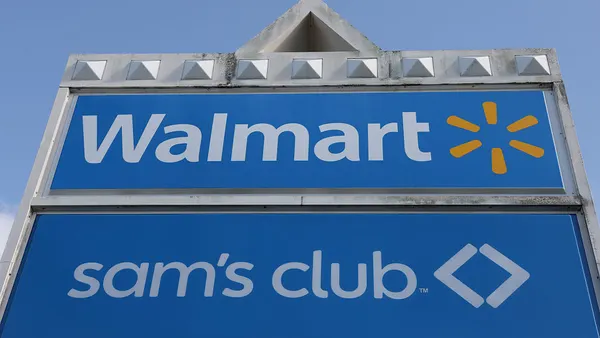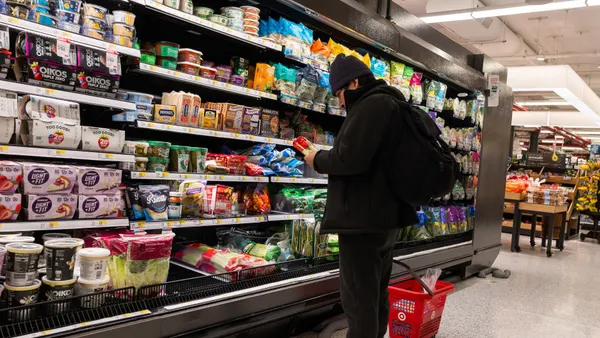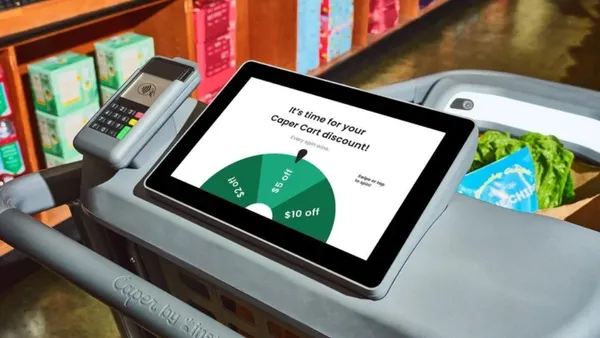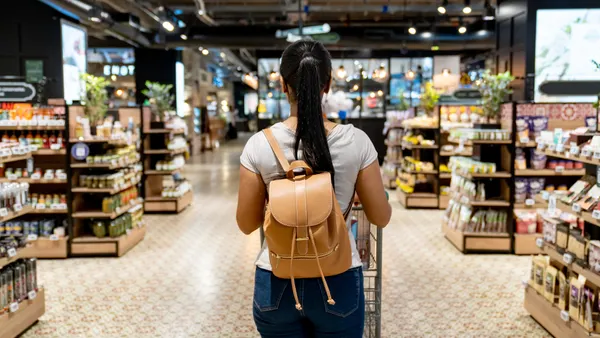Dive Brief:
- Ahold Delhaize reported net sales of $11.2 billion for its U.S. banners during the fourth quarter ended December 30, a 2.6% increase from the same period last year. Same-store sales in the U.S. grew 2.7%. Overall, the Dutch-Belgian retailer said net sales across the company rose 3% to 16.5 billion euros ($18.78 billion).
- Online sales in the U.S. for the quarter increased 12.1% to $231 million while overall e-commerce sales for Ahold Delhaize grew 26.2% to more than $1.26 billion.
- Full-year net sales in the U.S. for 2018 totaled $42.64 billion, a 2.5% drop from fiscal 2017 but a 1.9% gain when adjusted to constant exchange rates. Net sales for Ahold Delhaize’s U.S. and European operations rose 2.5% at constant rates for fiscal 2018. The company, which will release its full-year results and Q4 commentary next month, expects to end up at the higher end of its guidance of $1.71 to $1.82. It anticipates cash flow to be more than $2.28 billion, with capital expenditures for the year of $2.05 billion.
Dive Insight:
Ahold Delhaize noted its online sales growth in the U.S., which was slightly better than the previous quarter, indicates its e-commerce initiatives are “gaining traction” with shoppers. This may be, but that growth is slower than other major U.S. grocers and pales in comparison to the company’s gains in Europe, where online sales grew 30% in Q4 to more than $1 billion.
Greater maturity of e-commerce in Europe explains much of this disparity. However, it also reflects what analysts say is Ahold Delhaize’s languid response to U.S. e-commerce demand and the underperformance of key assets, including Peapod.
Ahold Delhaize has made clear it doesn’t intend to maintain the status quo. Peapod, the largest e-grocer in the U.S., has undergone significant changes of late, including lowering prices, adding new features like voice ordering and boosting in online and in-store promotions to increase visibility.
In a bid to inject some of its European success into its U.S. operations, Ahold Delhaize in November named Selma Postma as Peapod’s new president. Postma worked at Albert Heijn for nearly two decades where she accelerated online growth to more than 20% annually and launched several initiatives to connect with consumers, including establishing a single sign-on with bol.com, the largest online non-food retailer in the Netherlands.
Ahold Delhaize also is integrating Peapod with its physical stores, serving as the fulfillment service for store pickup as well as delivery orders. The company has streamlined operations to make this happen, aligning incentives for its store managers and Peapod managers to ensure the two parties are working together.
“They changed that structure [in 2018],” Elley Symmes, an analyst with Kantar Consulting who follows Ahold Delhaize, recently told Grocery Dive. “That’s going to create a much more all-encompassing omnichannel offering that helps with inventory, that helps with volume.”
Looking at the broader business, 2018 saw Ahold Delhaize attempt to jumpstart other underperforming assets. Stop & Shop, which has struggled with sales volumes in recent quarters, initiated a chain refresh in October, while Giant Food announced a new urban concept that may penetrate urban markets after the company’s bfresh brand failed to do so. That store, dubbed Heirloom Market, opens Friday in Philadelphia’s Graduate Hospital neighborhood. A similar overhaul at its Food Lion banner is 70% complete, the company said, and so far has shown to be a sound investment. Food Lion is benefiting from an uptick in sales following a chain-wide store update underway focusing on fresh and prepared foods.
Morningstar analyst Ioannis Pontikis said in a note that he was "pleased to see continuous improvement in the
United States" which is responsible for more than 60% of the company's sales.
"Although rarely does a quarter make a trend, we will be closely monitoring the group's in-store sales growth in the coming quarters, especially in the U.S., for signs of a sustainable reversal of trends," he said, noting that Ahold Delhaize shares "look slightly overvalued."
Cutting-edge technology, including driverless delivery and an army of aisle-scanning robots, are part of Ahold Delhaize’s strategy to match industry heavyweights like Kroger and Walmart. So, too, is the acquisition of stores and regional chains that can bolster the retailer’s market share in key East Coast markets. Earlier this month, Stop & Shop acquired Long Island’s struggling King Kullen chain.
It’s not hard to imagine Ahold Delhaize acquiring more struggling competitors in regions where it has a No. 1 or No. 2 position. But according to observers, the company needs to take a more strategic approach. Symmes believes the King Kullen acquisition was a defensive move that will require a hefty investment to bring it up to speed.
“Sure, this will help Ahold Delhaize defend turf in the Long Island and New Jersey area against emerging players like Lidl and Amazon/Whole Foods, but it will also draw resources away from (areas where) Ahold Delhaize must concentrate,” like e-commerce and de-centralization, she wrote in an email to Grocery Dive.
Ahold Delhaize’s de-centralized structure, initiated in 2017, helps banners respond to market changes and shopper preferences. And the approach may be paying off incrementally, with U.S. market share expected to increase this year, as the company noted in this latest earnings report. To hold off heavy hitters like Amazon, Walmart, Kroger and Aldi, however, Ahold Delhaize will need to ensure every aspect of its business is performing at a high level. It can't afford to have weak banners and an undercooked online business going forward.













